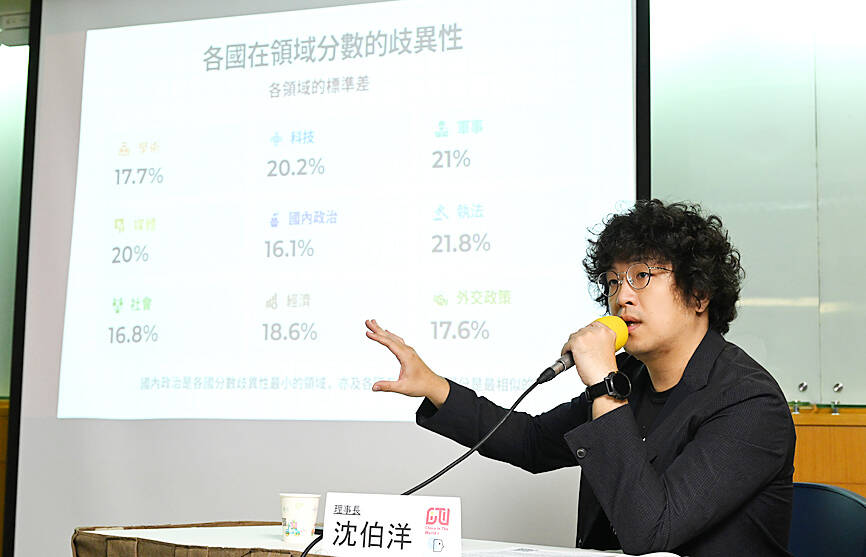China has stronger influence over Taiwan’s media and society than any other country, the Taipei-based Doublethink Lab think tank said yesterday, as it announced its China Index gauging Beijing’s global influence.
Taiwan ranked 11th overall among 82 countries assessed, but first in terms of social and media influence, Doublethink Lab chairman Puma Shen (沈伯洋) told a news conference in Taipei.
More than 200 experts and academics participated in the project, including some highly influential figures, Shen said.

Photo: Liao Chen-huei, Taipei Times
The index collects information from countries worldwide to gauge China’s influence and assess how Chinese policies affect them, Shen said.
In terms of Chinese influence in academia, the US ranked first, while other US sectors are affected by China’s efforts to weaponize trade, Shen said, adding that European nations, which have established measures to combat Chinese influence, are among the least influenced.
Beijing attempts to extend its influence through manipulation of the media and academic interaction, as well as trying to coerce other nations to adopt foreign policy goals in its favor after their economies have become reliant on China, Shen said.
These acts are part of Beijing’s objective to create a new world order under the “Chinese model,” which runs contrary to the rule of law concept embraced by the West, Shen said.
Pakistan, Cambodia, Thailand and other Asian countries are heavily affected by China in the fields of economy and technology, Shen said.
The index was also referenced in the “China’s Global Influence and Interference Activities” hearing on Thursday at the US-China Economic and Security Review Commission, an independent US government agency.
Taiwan, which has resisted such influence by introducing flexible policies, was invited to the hearing to share its experience and provide suggestions on resisting China’s influence, Shen said.
The US executive branch should counteract China’s manipulation and propagation of false information so that Washington can remain in a global leadership position, Shen said.
Taiwan and the US should consider establishing a joint center of excellence to draft policies to combat Chinese influence, as well as international standards to resolve the spread of false or manipulative information, Shen said.

Seventy percent of middle and elementary schools now conduct English classes entirely in English, the Ministry of Education said, as it encourages schools nationwide to adopt this practice Minister of Education (MOE) Cheng Ying-yao (鄭英耀) is scheduled to present a report on the government’s bilingual education policy to the Legislative Yuan’s Education and Culture Committee today. The report would outline strategies aimed at expanding access to education, reducing regional disparities and improving talent cultivation. Implementation of bilingual education policies has varied across local governments, occasionally drawing public criticism. For example, some schools have required teachers of non-English subjects to pass English proficiency

‘FORM OF PROTEST’: The German Institute Taipei said it was ‘shocked’ to see Nazi symbolism used in connection with political aims as it condemned the incident Sung Chien-liang (宋建樑), who led efforts to recall Democratic Progressive Party (DPP) Legislator Lee Kun-cheng (李坤城), was released on bail of NT$80,000 yesterday amid an outcry over a Nazi armband he wore to questioning the night before. Sung arrived at the New Taipei City District Prosecutors’ Office for questioning in a recall petition forgery case on Tuesday night wearing a red armband bearing a swastika, carrying a copy of Adolf Hitler’s Mein Kampf and giving a Nazi salute. Sung left the building at 1:15am without the armband and apparently covering the book with a coat. This is a serious international scandal and Chinese

TRADE: The premier pledged safeguards on ‘Made in Taiwan’ labeling, anti-dumping measures and stricter export controls to strengthen its position in trade talks Products labeled “made in Taiwan” must be genuinely made in Taiwan, Premier Cho Jung-tai (卓榮泰) said yesterday, vowing to enforce strict safeguards against “origin laundering” and initiate anti-dumping investigations to prevent China dumping its products in Taiwan. Cho made the remarks in a discussion session with representatives from industries in Kaohsiung. In response to the US government’s recent announcement of “reciprocal” tariffs on its trading partners, President William Lai (賴清德) and Cho last week began a series of consultations with industry leaders nationwide to gather feedback and address concerns. Taiwanese and US officials held a videoconference on Friday evening to discuss the

PERSONAL DATA: The implicated KMT members allegedly compiled their petitions by copying names from party lists without the consent of the people concerned Judicial authorities searched six locations yesterday and questioned six people, including one elderly Chinese Nationalist Party (KMT) member and five KMT Youth League associates, about alleged signature forgery and fraud relating to their recall efforts against two Democratic Progressive Party (DPP) legislators. After launching a probe into alleged signature forgery and related fraud in the KMT’s recall effort, prosecutors received a number of complaints, including about one petition that had 1,748 signatures of voters whose family members said they had already passed away, and also voters who said they did not approve the use of their name, Taipei Deputy Chief Prosecutor